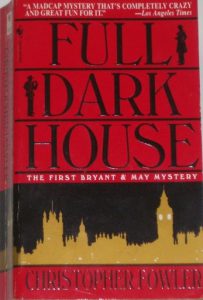Search the Blog
Categories
- Books & Reading
- Broadband Buzz
- Census
- Education & Training
- Friday Reads
- General
- Grants
- Information Resources
- Library Management
- Nebraska Center for the Book
- Nebraska Libraries on the Web
- Nebraska Memories
- Now hiring @ your library
- Preservation
- Pretty Sweet Tech
- Programming
- Public Library Boards of Trustees
- Public Relations
- Talking Book & Braille Service (TBBS)
- Technology
- Uncategorized
- What's Up Doc / Govdocs
- Youth Services
Archives
Subscribe
Tag Archives: London
Friday reads: Full Dark House, by Christopher Fowler
I noticed among the new titles shown at the library, the latest Bryant and May, Peculiar Crimes Unit title was out. So, instead of picking it up, I went and started at the beginning. The first title in the series is Full Dark House, by Christopher Fowler. When he launched the series he had 10 literary titles, and over 100 short stories written, according to reviewer, Joe Hartlaub, of Bookreporter.com, who describes Christopher Fowler’s writing as quirky, and in Full Dark House “There are elements of mystery (ala Conan Doyle and Agatha Christie), police procedurals, horror, history and suspense aplenty here.” It is one of the best, most atmospheric stories about the bombing of London during World War II, and the citizen’s response to it, I’ve ever read. It made me feel the terror and unease of everyday life at that time. Fowler also laces it with the humor, sometimes dark, such as is often found in the TV British detective series “Midsomer Murders” as well as the odd murders, and strange motives for murder.
Two stories run beside each other, the bombing of the unit in the present day, and the murders that brought eccentric Arthur Bryant and scientific John May, together in Nov, of 1940, when they were 22 and 19. Bryant was doing research on his memoir, reading notes about the case, and had gone to the nursing facility where the last person living concerned in the events of 1940 resided. Bryant often stayed at the office overnight, so when the office exploded in the dark of early morning 2003, and a body is found there, it is presumed his.
The case in 1940 involves deaths in a theater in London called the Palace, and a controversial, intentionally risqué, production of Orpheus in Hell, by Jacque Offenbach. The production is set to run all during the war, as a distraction from the horrors, ostensibly, and produced by a Greek Shipping Tycoon. The most puzzling thing about the murders is the lack of evidence, and the lack of motive.
There is atmosphere in both timelines, but especially the World War II scenes of London with details like “Get you home” booths, that I’d never heard of before, to help citizens find their way home among bombed out streets, after the all clear had been blown. Reminders of black out curtains, and cross tapping on windows, to reduce flying glass from bombing enhance the atmosphere. The current timeline shows how much time has elapsed for the detectives, the changes in the city, and the grieving of the remaining staff of the unit, plus the state of gang relations in 2003 in London.
This is not a cozy mystery, but, it is intriguing, well written, and, yes, quirky. The Peculiar Crimes Unit continues on, with the two oddly matched detectives far past retirement age, solving murders in unusual ways. I admit, I’m on my third story, the fourth in the series.
Full Dark House, by Christopher Fowler, a Bryant and May Mystery, C 2003, A Bantam Book, Doubleday UK hardcover ed.,
Next in series is The Water Room
Benches Encourage Reading
 Fifty “book benches” are illustrating the joys of reading on the streets of London this summer. Each book-shaped bench is covered with a colorful picture. The benches are part of the National Literacy Trust’s Books about Town campaign to celebrate books and reading. Benches feature Sherlock Holmes, James Bond, Mary Poppins, the works of Dr Seuss, and many others. This fall, the benches will be auctioned off to raise funds for the NLT. It’s an impractical wish, but wouldn’t it be great to have one of them?
Fifty “book benches” are illustrating the joys of reading on the streets of London this summer. Each book-shaped bench is covered with a colorful picture. The benches are part of the National Literacy Trust’s Books about Town campaign to celebrate books and reading. Benches feature Sherlock Holmes, James Bond, Mary Poppins, the works of Dr Seuss, and many others. This fall, the benches will be auctioned off to raise funds for the NLT. It’s an impractical wish, but wouldn’t it be great to have one of them?


